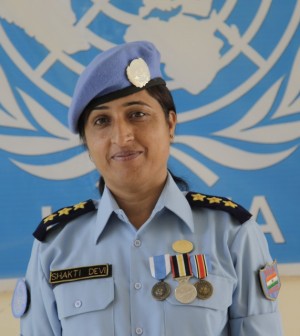- Finding Unshakable Power in a World That Wants to Pull Us ApartPosted 4 months ago
- What could a Donald Trump presidency mean for abortion rights?Posted 4 months ago
- Financial Empowerment: The Game-Changer for Women in Relationships and BeyondPosted 5 months ago
- Mental Health and Wellbeing Tips During and After PregnancyPosted 6 months ago
- Fall Renewal: Step outside your Comfort Zone & Experience Vibrant ChangePosted 6 months ago
- Women Entrepreneurs Need Support SystemsPosted 6 months ago
Shakti Devi: From Village Girl to International Peacekeeper

Author: Fayaz Bukhari
from Thomson Reuters Foundation
SRINAGAR, India (Thomson Reuters Foundation) – As a young girl growing up in a remote Indian Himalayan village, Shakti Devi dreamed of becoming a policewoman. She has more than fulfilled that dream, winning recognition this month for her work supporting Afghan abuse victims and women police officers.
Devi, 41, a police inspector serving with the United Nations Assistance Mission in Afghanistan (UNAMA), was awarded the 2014 International Female Peacekeeper Award for what the judges called her “exceptional achievements”.
Based in Afghanistan’s western province of Herat since May last year, Devi has established Women’s Police Councils where the few female Afghan police officers can seek professional support and advice.
She has also helped victims of sexual and physical violence get justice, by the arrest of suspects, bringing cases to trial, or through mediation.
“Afghan women face a lot of problems when compared with India. In Afghanistan, women can’t work in offices, outside their homes, for NGOs and especially in the police force,” Devi told the Thomson Reuters Foundation in an interview by phone from Herat.
“They can’t even go to school and don’t have proper medical facilities, and many of them die during childbirth. It is the most difficult place for women.”
A 2011 poll by the Thomson Reuters Foundation found that violence, dismal healthcare and brutal poverty made Afghanistan the world’s most dangerous country for women, with Congo a close second due to horrific levels of rape.
The shortage of female police officers means women rarely report abuse. Despite recruitment drives, women make up just one percent of Afghanistan’s 160,000-strong police force. They are often humiliated, discriminated against and even sexually abused by male colleagues.
Devi, who was born and brought up in a remote village in Jammu and Kashmir, said she understood the problems of living in a conservative, patriarchal society but believed that women had to recognise and assert their rights.
“Women must realise the essence of liberty and dignity. It is imperative for women to be aware of their inherent strength to fight all social, economic, political and all other adversities,” she said.
The police inspector said her father, a flour mill owner, raised her along with her six siblings after her mother died when she was 16.
Like other children in her village in Udhampur district, she often helped her father – rearing cattle, collecting firewood and working at the mill.
Her father, however, understood the value of education and encouraged her to study further, though most girls in the village had been forced to drop out of school by the time they reached adolescence.
Achieving her dream of becoming a policewomen was not easy.
Her secondary school was 10 km (6 miles) from her village, so she would travel 20 km (12 miles) every day, often on foot as there were few buses.
Her father was also not initially supportive about her joining the police, saying it was “tough and risky”. He wanted her to be a teacher, but eventually agreed to her demand when he realised that she was not willing to give up.
Devi has now been in the police force for 15 years, focusing on crimes against women since 2009 when she was appointed head of the policewomen’s cell in her area.
“I handled 3,000 complaints from women, from matrimonial disputes to domestic violence to rapes. I managed to settle 80 to 90 percent of cases by involving local elders, NGOs, local council representatives, community leaders. The remaining 10 to 20 percent of cases were sent to the courts,” she said.
“I made the police station more like a community centre and even complex issues were resolved within a year. It was a different kind of experience. Resolving women’s issues changed my perception.”
(Reporting by Fayaz Bukhari, writing by Nita Bhalla, editing by Tim Pearce http://www.trust.org)


